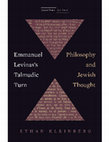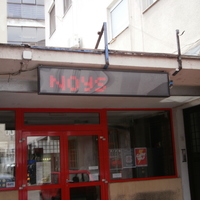Books by Ethan Kleinberg

Stanford University Press, 2021
In this rich intellectual history of the French-Jewish philosopher Emmanuel Levinas's Talmudic le... more In this rich intellectual history of the French-Jewish philosopher Emmanuel Levinas's Talmudic lectures in Paris, Ethan Kleinberg addresses Levinas's Jewish life and its relation to his philosophical writings while making an argument for the role and importance of Levinas's Talmudic lessons. Pairing each chapter with a related Talmudic lecture, Kleinberg uses the distinction Levinas presents between "God on Our Side" and "God on God's Side" to provide two discrete and at times conflicting approaches to Levinas's Talmudic readings. One is historically situated and argued from "our side" while the other uses Levinas's Talmudic readings themselves to approach the issues as timeless and derived from "God on God's own side." Bringing the two approaches together, Kleinberg asks whether the ethical message and moral urgency of Levinas's Talmudic lectures can be extended beyond the texts and beliefs of a chosen people, religion, or even the seemingly primary unit of the self. Touching on Western philosophy, French Enlightenment universalism, and the Lithuanian Talmudic tradition, Kleinberg provides readers with a boundary-pushing investigation into the origins, influences, and causes of Levinas's turn to and use of Talmud.

This book argues for a deconstructive approach to the practice and writing of history at a moment... more This book argues for a deconstructive approach to the practice and writing of history at a moment when available forms for writing and publishing history are undergoing radical transformation. To do so, it explores the legacy and impact of deconstruction on American historical work; the current fetishization of lived experience, materialism, and the "real;" new trends in philosophy of history; and the persistence of ontological realism as the dominant mode of thought for conventional historians.
Arguing that this ontological realist mode of thinking is reinforced by current analog publishing practices, Ethan Kleinberg advocates for a hauntological approach to history that follows the work of Jacques Derrida and embraces a past that is at once present and absent, available and restricted, rather than a fixed and static snapshot of a moment in time. This polysemic understanding of the past as multiple and conflicting, he maintains, is what makes the deconstructive approach to the past particularly well suited to new digital forms of historical writing and presentation.
Papers by Ethan Kleinberg

Annales. Histoire, Sciences Sociales, Sep 1, 2020
Les Annales, force et fragilité d’une revue modèleCet article interroge l’héritage, la mission et... more Les Annales, force et fragilité d’une revue modèleCet article interroge l’héritage, la mission et l’avenir des Annales en se concentrant sur les dix dernières années de la revue. Pour ce faire, il reprend quelques-uns des choix éditoriaux, des thèmes et des articles récents afin d’explorer la façon dont ceux-ci servent à se libérer des modèles et des méthodes associés au passé des Annales, tout en analysant la manière dont certains des aspects de ce passé sont conservés. Les Annales se sont longtemps caractérisées par leur(s) approche(s) méthodologique(s) plutôt que par un sujet ou un thème spécifique. La force de ce paradigme réside dans ses aspirations interdisciplinaires, qui ont rassemblé des historiens issus d’horizons divers dans le but partagé de remettre en question le statu quo. Cet accent mis sur la méthode a toutefois un revers : conduire à la promotion, sinon d’un style, du moins d’une approche propre aux Annales, quitte à ossifier le paradigme et lui faire perdre sa nature protéiforme. L’article tente ainsi d’expliquer non seulement les promesses et les pièges, mais aussi les nouvelles directions que la revue pourrait prendre à l’avenir.
Rivista internazionale di storia della storiografia, 2009
... This is to say that unlike the ghost of Marley, the Ghosts of Christmas Past, Present, and Fu... more ... This is to say that unlike the ghost of Marley, the Ghosts of Christmas Past, Present, and Future appear to be well jointed in terms of ... II. The Return of the Real For Eelco Runia, the publication of Hayden White's Metahistory was a watershed moment that led to a «process in which ...
Annales. Histoire, Sciences Sociales, 2020
Bloomsbury Academic eBooks, 2023
Cornell University Press eBooks, Oct 24, 2013
The Cambridge History of Modern European Thought, 2019

Annales. Histoire, Sciences Sociales, 2020
Les Annales, force et fragilité d’une revue modèleCet article interroge l’héritage, la mission et... more Les Annales, force et fragilité d’une revue modèleCet article interroge l’héritage, la mission et l’avenir des Annales en se concentrant sur les dix dernières années de la revue. Pour ce faire, il reprend quelques-uns des choix éditoriaux, des thèmes et des articles récents afin d’explorer la façon dont ceux-ci servent à se libérer des modèles et des méthodes associés au passé des Annales, tout en analysant la manière dont certains des aspects de ce passé sont conservés. Les Annales se sont longtemps caractérisées par leur(s) approche(s) méthodologique(s) plutôt que par un sujet ou un thème spécifique. La force de ce paradigme réside dans ses aspirations interdisciplinaires, qui ont rassemblé des historiens issus d’horizons divers dans le but partagé de remettre en question le statu quo. Cet accent mis sur la méthode a toutefois un revers : conduire à la promotion, sinon d’un style, du moins d’une approche propre aux Annales, quitte à ossifier le paradigme et lui faire perdre sa nat...
The American Historical Review, 2005
AFTER THE DELUGE New Perspectives on the Intellectual and Cultural History of Postwar France Edit... more AFTER THE DELUGE New Perspectives on the Intellectual and Cultural History of Postwar France Edited by Julian Bourg D LEXINGTON BOOKS Lanham Boulder New rork T" oio"'<'" Med ... CONTENTS Acknowledgments vm Introduction I Julian Bourg I. HISTORICIZING ...
The Oxford Handbook of Levinas
This article attempts to understand Levinas as a reader of Jewish texts, with particular attentio... more This article attempts to understand Levinas as a reader of Jewish texts, with particular attention paid to his Talmudic commentaries. To do so, the entangled relation between oral and written texts is explored; one must be able to properly “read” but also “write,” and there is the related issue of the methodology and training to be able to do so properly. Levinas offers commentary on each issue. Several interpretations of Talmudic texts and an important discussion of reading Scripture are analyzed in order to elucidate Levinas’s reading strategies, what this tells us about his relation to the larger tradition of Talmudic commentary, and Levinas’s particular historical moment, especially the role of the Holocaust for his approach to reading the Talmud and traditional texts.
Stanford University Press eBooks, Oct 19, 2021
Paroles gelées, 1999
Campus Programs Committee of the Programs Activities Board Graduate Students Association Paroles ... more Campus Programs Committee of the Programs Activities Board Graduate Students Association Paroles Gelees was established in 1983 by its founding editor, Kathryn Bailey. The journal is managed and edited by the French Graduate Students' Association and published annually under the auspices of the Department of French at UCLA. Information regarding the submission of articles and subscriptions is
Historical Understanding, 2022
#TheoryRevolt begins! HERE WE STAND! Read the "Theses on Theory and History" by... more #TheoryRevolt begins! HERE WE STAND! Read the "Theses on Theory and History" by Wild On Collective (Ethan Kleinberg, Joan Scott, Gary Wilder) at: TheoryRevolt.com Share, print, post, distribute, discuss. Join #TheoryRevolt Now!
The Trace of God, 2020
This paper explores the role that the “Jewish Question” plays in the divergent though intertwined... more This paper explores the role that the “Jewish Question” plays in the divergent though intertwined presentation of Jewish identity in the post World War Two philosophies of Emmanuel Levinas and Jacques Derrida.

This book argues for a deconstructive approach to the practice and writing of history at a moment... more This book argues for a deconstructive approach to the practice and writing of history at a moment when available forms for writing and publishing history are undergoing radical transformation. To do so, it explores the legacy and impact of deconstruction on American historical work; the current fetishization of lived experience, materialism, and the "real;" new trends in philosophy of history; and the persistence of ontological realism as the dominant mode of thought for conventional historians. Arguing that this ontological realist mode of thinking is reinforced by current analog publishing practices, Ethan Kleinberg advocates for a hauntological approach to history that follows the work of Jacques Derrida and embraces a past that is at once present and absent, available and restricted, rather than a fixed and static snapshot of a moment in time. This polysemic understanding of the past as multiple and conflicting, he maintains, is what makes the deconstructive approach to the past particularly well suited to new digital forms of historical writing and presentation.











Uploads
Books by Ethan Kleinberg
Arguing that this ontological realist mode of thinking is reinforced by current analog publishing practices, Ethan Kleinberg advocates for a hauntological approach to history that follows the work of Jacques Derrida and embraces a past that is at once present and absent, available and restricted, rather than a fixed and static snapshot of a moment in time. This polysemic understanding of the past as multiple and conflicting, he maintains, is what makes the deconstructive approach to the past particularly well suited to new digital forms of historical writing and presentation.
Papers by Ethan Kleinberg
Arguing that this ontological realist mode of thinking is reinforced by current analog publishing practices, Ethan Kleinberg advocates for a hauntological approach to history that follows the work of Jacques Derrida and embraces a past that is at once present and absent, available and restricted, rather than a fixed and static snapshot of a moment in time. This polysemic understanding of the past as multiple and conflicting, he maintains, is what makes the deconstructive approach to the past particularly well suited to new digital forms of historical writing and presentation.
Panelists: Ethan Kleinberg, Robert Doran, Lisa Lowe, Edward Dimendberg
Moderator: Winston James